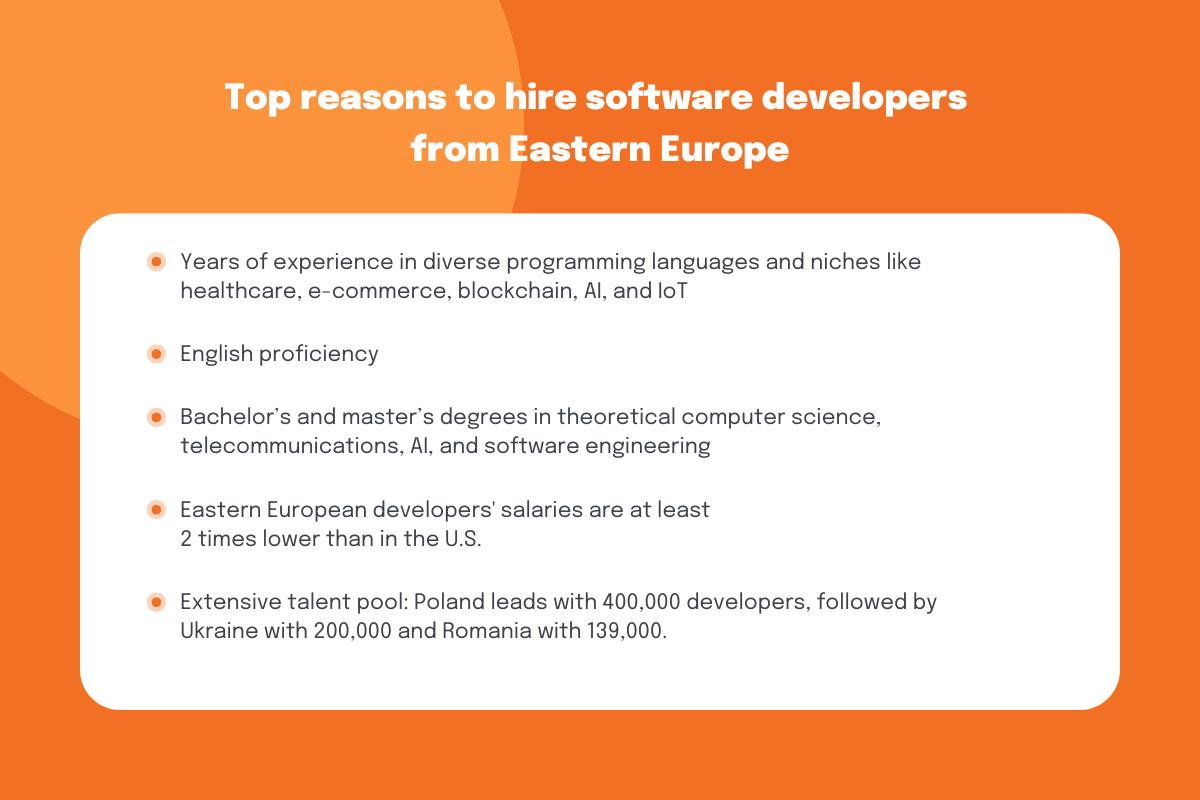Eastern Europe is now one of the world’s most favorable IT outsourcing destinations. Leading tech companies such as Apple, Google, IBM, and Microsoft opened software development centers in Eastern Europe.
At the same time, smaller tech companies have also shifted their focus to Central and Eastern European developers. Though the custom software development rates in Poland, Ukraine, the Czech Republic, etc., are higher than in India or the Philippines, salaries still remain reasonable when compared to the US or the UK.
Eastern European developers can deliver exceptional quality IT services, have a convenient time zone difference, and have fewer cultural differences than in Asia. Combining these factors with the perfect cost-to-quality ratio makes outsourcing software development to Eastern Europe an ideal option. That’s why more and more brands are switching to leading Eastern European software development companies.
Table of Contents
Software development in Eastern Europe: Top countries to outsource IT projects
Ukraine, Poland, and Romania are the most popular destinations when it comes to software development outsourcing in Eastern Europe, while Serbia, Macedonia, Bulgaria, Hungary, and Georgia are runner-uppers.
Here are some facts about the IT industry in these countries.
Ukraine
In 2014, the country’s new government started supporting investments from abroad. This led to a boost in investments in Ukrainian IT companies, which continues even during a full-scale war. Kyiv, Lviv, and Kharkiv are the largest Ukrainian IT hubs.
Now, the Ukrainian IT market is represented by over 1,500 software development companies where 200,000 IT professionals are currently employed. Furthermore, this number is expected to grow because the country’s universities release 15,000 tech graduates annually. Several additional facts:
- In 2020, the country’s global IT export exceeded $5 billion.
- In 2021, Ukraine was named the “Delivery Destination of the Year” by the Global Sourcing Association (GSA).
- Since 2021, more than 126 Ukrainian startups have raised their venture capital funding.
- Ukraine is featured in Gartner’s top 30 countries for offshore services.
- In 2021, the number of Ukraine’s certified IT specialists increased by 29K, which brought the total to 212,000 IT professionals.
- In 2022, according to EECA University Rankings, 41 Ukrainian universities were acknowledged for IT excellence, including 3 ranked in the top 100 best institutions of higher education.
- In 2022, even during the full-scale war, the IT field services have grown by 13%, and its export by up to 23%.
- Java, JavaScript, C#, PHP, and Python are Ukrainian IT professionals’ most popular programming languages.
- Some of the world’s renowned startups, such as Petcube, Preply, and Grammarly, were born in Ukraine.
Poland
As a member of the EU with the fastest-growing economy, Poland offers favorable conditions for companies that are thinking of outsourcing software development.
With over 400 software companies featuring over 401,000 skilled professionals and the IT market growing steadily at a rate of 5%–10% annually, the country remains the top offshore destination in Eastern Europe. Additionally:
- Poland ranks 11th in the world’s top 50 digital nations as per the Tholons Globalization Index 2018.
- The Top Coder ranking currently features Polish developers in 4th place in the world in terms of skills.
- Poland ranks 3rd in the world for the best developers, per HackerRank challenges scores in 2018.
- In 2021, Poland was in the top 20 best offshore countries in the world.
- In 2022, Poland ranked 46th in the World Digital Competitiveness Ranking 2022.
Romania
The Romanian government had once created favorable tax conditions for companies providing software development services. The industry has rapidly grown and attracted global tech companies such as Microsoft, Ericsson, HP, and Huawei.
The country now has almost 140,000 IT professionals working at almost 20,000 companies, with an annual increment of 7,000 tech graduates.
- In 2017, software outsourcing in Romania grew to $4.2 billion and generated 5% of the GDP.
- Romania ranks 20th in the world for developers, per HackerRank.
- Due to the favorable business environment, financial attractiveness of custom software development rates, excellent tech skills, and availability, Romania ranked 28th in A.T. Kearney’s 2019 Global Services Location Index.
- In 2022, Romania ranked 49th in the World Digital Competitiveness Ranking 2022.
Software developers in Eastern Europe: Differences
Earlier, we discussed the software development market in various Eastern European countries, such as Ukraine, Poland, and Romania. This article summarizes and compares our findings and insights into the differences between Eastern European developers from the best countries for outsourcing software development in this region.
In recent years, Eastern Europe has become a mainstream outsourcing location for software development because it offers an attractive cost-to-quality ratio, though not merely low rates like you can find in India or the Philippines.
Eastern European countries, such as Poland, Ukraine, and Romania, are the top outsourcing countries, according to Tholons and A.T. Kearney global consulting firms.
Geographically, all these countries are near each other and Western Europe. Moldova and Romania have pretty poor infrastructure, while Ukraine is continually improving its transport and road infrastructure. Additionally, the political situation in Eastern European countries varies but is fairly stable overall.
Furthermore, Eastern European software developers are proficient in English and have strong technical and soft skills. As a result, Eastern Europe has recently become a mainstream outsourcing location for software development.
Based on our research and direct experience in Eastern European software development outsourcing, we note the following differences between Eastern European countries:
| Criteria | Ukraine | Poland | Romania | Moldova |
| English level* | Intermediate to Upper-Intermediate | High | High | Intermediate to Upper-Intermediate |
| Pricing** | $35—57/h | $41—87/h | $35—65/h | $20—29/h |
| Size of Talent Pool | ~ 285,000 | ~401,000 | ~140,000 | ~24,000 |
| Industry focus | Startups, custom software development, eCommerce | Enterprise | FinTech | Mid-Size Projects |
| Core technologies | PHP, Python, Java, .Net | PHP, Java, .Net | PHP, Java | PHP |
* According to the Future of IT report, 2022
** Please, remember, that hiring a senior developer with exceptional skills will always cost more than average.
Browse 500+ Dev Teams Available for Hire
Reasons to outsource software development to Eastern European developers
1. Technical stack
The technical skills of Eastern European developers are well-regarded. All of the aforementioned countries were part of, or are heavily influenced by, the former Soviet Union, which left a legacy of relatively high-quality technically-educated individuals — even if a little too specialized for contemporary tastes. The focus of education in Eastern Europe has made the transition from hardware to focusing more on software in response to the former market expansion and latter contracting.
Eastern European development teams can offer years of experience in different programming languages and in various niches, such as healthcare, e-commerce, blockchain, artificial intelligence, and IoT. Additionally, Eastern European software engineers are proficient in mobile app, web development, and QA testing. Web development implies creating interactive web pages while iOS and Android developers are building mobile applications for given operating systems.
2. Language proficiency
The English level of software developers is essential for successful cooperation. Overall, developers in all reviewed countries have a good grasp of English, which is a mandatory requirement for the IT industry.
Eastern European developers work primarily with international companies where a high or, at least, moderate proficiency in English is an essential requirement. The second most in-demand foreign language among developers in Poland is German, while French is almost as widespread as English in Romania.
3. Profile education
In Eastern Europe, software engineers acquire computer science degrees at both bachelor’s and master’s levels, with a focus on theoretical computer science, telecommunications, artificial intelligence, and software engineering.
For example, Ukrainian universities such as the Taras Shevchenko National University of Kyiv and Lviv Polytechnic National University are highly ranked in computer science, and are considered major centers of advanced learning and progressive thinking.
In Romania, both public and private universities offer computer science programs. Such institutions as The Technical University of Cluj-Napoca and the University of Bucharest offer programs in applied automation, computer science, information security, and communication networks.
Whereas in Poland, Warsaw University of Technology offers computer science programs focusing on advanced algorithms, distributed computing, knowledge representation and reasoning, and data mining.
Additionally, developers in Eastern Europe are receiving advanced training to keep up with new technologies. Training opportunities organized by private companies such as PRJCTR, Hillel, robot_dreams, and Lviv IT School are becoming more common. The most popular programming languages that developers in Eastern Europe are improving include JavaScript, Python, SQL, and Java.
Constantly striving for knowledge, developers in the region achieve successful results in online competitions and high scores in course evaluations. For example, Coursera has compiled an average score by country in business, technology, and data science domains. The study found three Eastern European countries — Belarus, Ukraine, and Poland — ranked in the top 10 for technical proficiency, making Eastern Europe a cutting-edge region for reskilling technical talent.
4. Development rates
In terms of offshore software development rates compared to Eastern European countries, their developers offer fairly low prices compared to their Western counterparts. Software development in Eastern Europe is typically two or even three times less expensive than in the US. The highest rates for all types of developers among the reviewed countries are in Poland—$50–$99/hour, which is still lower than Western European rates.
The lowest prices for outsourcing software development are in Moldova—$20–$34/hour. Ukraine and Romania offer intermediate hourly rates of $35–$49.
Let’s also compare the annual salaries for in-house Java developers and hourly rates for freelancers and contractors in different countries as of 2024:
Annual salary, based on the data from Indeed.com, Glassdoor.com, and Payscale.com
| Country | Junior Java Developer | Middle Java Developer | Senior Java Developer |
| United States | $70,000 | $104,700 | $180,000 |
| United Kingdom | $58,000 | $78,450 | $149,500 |
| Poland | $30,000 | $48,000 | $63,000 |
| Ukraine | $24,000 | $46,000 | $58,000 |
| Romania | $18,000 | $35,000 | $52,000 |
| Moldova | $14,000 | $28,000 | $45,000 |
Hourly freelance rates, based on the data from Upwork.com
| Country | Junior Java Developer | Senior Java Developer |
| United States | $30 | $80 |
| United Kingdom | $30 | $130 |
| Poland | $35 | $95 |
| Ukraine | $30 | $82 |
| Romania | $20 | $80 |
| Moldova | $20 | $70 |
Median hourly rates among contract developers who listed technology as a key skill. All years of experience. Data source: YouTeam
| Technology | Ukraine | Poland | Romania |
| AngularJS | $45 | $49 | $50 |
| Java | $45 | $58 | $50 |
| JavaScript | $44 | $55 | $55 |
| Node.js | $46 | $55 | $60 |
| PHP | $41 | $60 | $50 |
| Python | $46 | $55 | $55 |
| React.js | $45 | $55 | $55 |
| React Native | $45 | $55 | $55 |
| Ruby on Rails | $45 | $73 | – |
| Unity | $42 | – | – |
| WordPress | $39 | $48 | $42 |
5. Cultural value set (culture fit or “culture add”)
Despite the communist past of all of these countries, developers’ culture can be defined as western and progressive. Most of the developer communities are young people with more of an open mindset. In the context of mentality and personality, Romanians and Moldavians tend to be more risk-averse, which sometimes leads to a lack of innovative approaches.
Ukrainian and Polish developers, in turn, have more comprehensive experience working with global technology companies and top software development companies in Europe and other countries.
6. Convenient location and time zone
Another important thing to consider is the ability to synchronize and cooperate with the outsource developers. For example, engineers from Eastern Europe are located about two hours from London, while New York’s eastern time zone puts them seven hours ahead of their US counterparts. These two elements allow for an established development process with both in-house and outsourced employees.
Even though the time difference may be somewhat inconvenient for workers, it is still possible to have several hours overlap during which they can schedule important meetings or spend time discussing the workflow or urgent tasks.
7. Talent pool size
The talent pool size is an essential issue in choosing an outsourcing location for software development in Eastern Europe. However, it is often hard to estimate the number of software developers because local agencies tend to provide reports about their countries’ stats only once every few years.
According to Statista, the information and communications technology (ICT) industry employs 401,000 software engineers in Poland, 139,000 in Romania, 200,000 in Ukraine, and 30,000 in Moldova. There are also software developers from Ukraine who have chosen to work in Poland, as well as Moldovan developers, who are often recruited by Romanian software development companies.
Each of the observed countries has something specific to offer in terms of expertise in software development. For example, Romania is well known for its engagement in fintech, Poland is perfectly suited for R&D departments of global technology companies, Ukrainian developers are well-prepared to work with the most cutting-edge technologies, and Moldova is a fairly good choice for midsize projects to outsource.
Offshore software development in Eastern Europe: How and where to find a company
If you’re thinking of hiring Eastern European developers for your project, the following is a good place to start:
- Look up the profiles and read the reviews of software agencies on platforms, such as Clutch, LinkedIn, and Upwork.
- Contact local recruiters so they can assist you by choosing the developer(s) from their curated talent pool.
- Open an offshore development center in an Eastern European country with the help of a local software agency.
- Reach out to local IT communities that connect the clients with the best outsourcing companies in Europe.
So which Eastern European country is the best for software development?
If you are hesitating about which country to select for your project, here are some tips:
- Evaluate the tech stack required for your project. Each Eastern European country has its own strengths regarding the tech skills of local software engineers. For example, HackerRank reports that Ukrainian developers are first in security and belong to the top five in mathematics and distributed systems. The same report shows that Polish engineers rank first in Java and belong to the top five in the following domains: algorithms, tutorials, Python, and Shell.
- Evaluate your budget. The hourly rates of developers in different Eastern European countries vary slightly because of the different costs of living, but it does not impact the quality. Check the custom software development rates per country and choose the one that best fits your budget.
- Is your company an established business or a startup? For example, Ukraine is the best place for startups, while Polish development houses tend to focus on enterprise solutions, so this point is also important to consider.
Speaking of top software companies in Europe, no matter which country you choose for your outsourcing software development needs, it is important to make sure you have thoroughly screened and pre-vetted your offshore partners.
Software developers from Eastern Europe: FAQ
What are the best countries to outsource software development to in Eastern Europe?
According to experts, the three top locations for IT outsourcing in the Eastern European region are Poland, Romania, and Ukraine. Poland and Romania are members of the European Union; hence, the European standards in data protection and intellectual property are applied to each software development company in these countries. Ukraine, alternatively, is not a member of the EU but is known for its highly-skilled IT specialists and affordable rates.
What online collaboration tools are required to work with remote developers?
Unlike traditional collaboration tools for remote working, such as Slack and Zoom, distributed development teams require lots of additional software. For instance, code management tools—GitLab and Bitbucket—are critical to the success of any product. Read our blog about the collaboration tools that are essential for your development team to work together effectively.
Up to you: each Eastern European country has pros when it comes to software development
The best way to optimize this hiring process is to create a due-diligence checklist that will prevent you from losing sight of important points.
Usually, decisions regarding outsourcing software development to offshore locations (including Eastern Europe software outsourcing) are made based on recommendations or showcases. The birth and evolution of the British product GoPlanr.com can be an example of such a product success being developed by Ukrainian developers.
We at YouTeam make it easy and safe to find a perfectly matching team of engineers for any type of project. Over 50,000+ vetted devs from 32 countries, including top software companies in Europe, are available on our marketplace. We can compile a list of candidates available to start working on your project next week in 48 hours or less.








